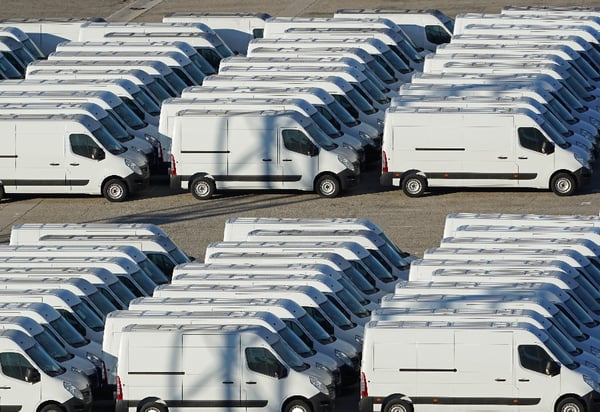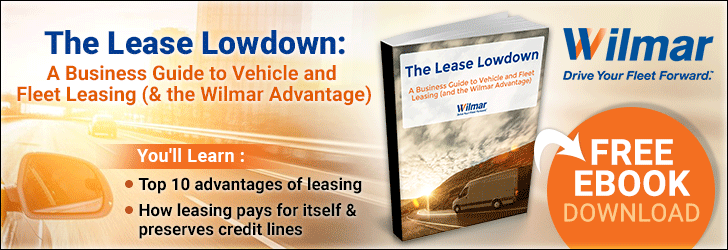
Whether used directly or indirectly, many businesses rely on their vehicle fleets to carry out daily operations. Their ability to optimally manage these vehicle fleets will make a significant difference with their overall expenses, efficiency, and productivity.
This is especially true with vehicle sourcing, as this is when fleet managers have the best opportunity to save money and choose the optimal vehicles. In an effort to help, let's examine what a fleet lease is and how it can help businesses.
What is a Fleet Lease?
When businesses need a bulk order of vehicles to start or replace their fleets, they can use the fleet lease option. Essentially, a fleet lease is a discounted bundled lease contract for businesses buying vehicles in bulk – usually new vehicles. Typically, fleet leasing is an option for businesses buying at least 5 vehicles at a time.
The main idea with fleet leasing is to save money and streamline the vehicle sourcing process. Basically, it helps businesses avoid paying retail prices and going through consumer leasing processes for each vehicle involved.
Manufacturers and car dealerships offer fleet leasing as a way to streamline services and discount prices for business clients while still making a good profit from the high volume of bulk sales involved. Most new car dealerships will have a dedicated fleet department to process these type of sales.
Businesses can also apply for a fleet number from a chosen automaker if they have 15 or more vehicles in their fleet and/or are making a one-time transaction involving 5 or more vehicles. This fleet number will make businesses a qualified fleet, bringing special discounts and allowing them to purchase/lease vehicles from any new car dealership selling that brand.
Fleet Vehicle Sourcing Options
Businesses have a few different fleet vehicle sourcing options, including:
-
buying new or used vehicles from a dealership (down payment/financing or cash outright)
-
leasing new or used vehicles from a dealership (open or closed-end leases)
-
consumer vs. commercial fleet buying or leasing (single vs. bulk)
The specific needs and variables of each business will ultimately determine the ideal option, yet most businesses will benefit from sourcing new vehicles with either an open or closed-end commercial fleet lease. This gives businesses the most bang for their buck and the most options with vehicle selection and lease terms.
Even if businesses aren't a qualified fleet business, they can still ask for fleet pricing from car dealerships. An article found at Tundra Headquarters explains more:
However, if your business doesn't own enough vehicles (or buy enough new cars each year) to qualify as a true 'fleet' business, you may still be able to work with the fleet salesperson at your local dealership. He or she will offer you 'fleet' pricing, which in reality is nothing more than retail customer pricing presented as a special program. In the car business, this is known as a 'fleetail' transaction.
As for the choice between open-end and closed-end leases, an article at Government Fleet explains
Fleets that are subjected to rough usage and incur high mileage are better suited for open-end leases.
...Fleets with passenger vehicles that run predictable yearly mileages, such as sales reps, are better candidates for closed-end leases. Wear and tear is more predictable, and the lessor can more definitively match the pre-set mileage cap to the driving pattern.
Essentially, closed-end leases have mileage caps and are more restrictive while open-end leases have no mileage caps, yet require businesses to pay for the vehicle's depreciation. The ideal option for businesses will depend on how their fleet vehicles are used in daily operations.
Also, if businesses are sourcing more than one vehicle for their fleet, they'll benefit by consolidating them into a master fleet lease vs. using a consumer lease for each one. This will give them fleet pricing, streamline the process, and bring other exclusive benefits.
Benefits of Fleet Leasing for Businesses
Fleet leasing is designed for businesses that cycle through vehicles on a regular basis and want to avoid paying large down payments and disposing of purchased vehicles after usage. Usually, this involves new cars, as leasing used cars limits selection and shortens the lifecycle of fleet vehicles.
Essentially, fleet leasing is for businesses seeking the most affordable and streamlined way to add multiple new vehicles to their fleets. Here are the main benefits of fleet leasing for businesses:
-
condenses vehicle leases into one master lease contract
-
using a dedicated fleet department streamlines the process
-
ability to customize orders for optimal vehicle pricing and functionality
-
no down payment needed (purchases and consumer leases have down payments)
-
new vehicles save maintenance and fuel costs
-
ability to waive dealer fees (depending on dealership)
-
increased management support (maintenance reminders, mileage tracking, fuel records, insurance claim assistance, etc.)
-
outsources administrative tasks (registration and license renewals, title transfer, etc.
Fleet leasing offers businesses the basic benefits of leasing plus the extra benefits of fleet leasing. In general, fleet leasing is the best option for businesses with 15 or more vehicles in their fleets and/or the need to lease multiple vehicles at once.
Even with heavy discounts from retail listing prices, car dealerships still make good profits with relatively little work. This gives them the incentive to optimize fleet purchasing and leasing processes with customized services and dedicated departments. Businesses can take advantage of this by partnering with a vehicle manufacturer and their affiliated new car dealerships to leverage the benefits of fleet leasing.
Conclusion
Fleet leasing is an option for businesses with 15 or more vehicles in their fleets and/or the need to lease multiple vehicles at once. Typically, fleet leasing is offered by new car dealerships working directly with vehicle manufacturers, giving them the ability to offer bulk order discounts, wholesale pricing, and expanded customization options to their business clients.
While understanding the definition and benefits of fleet leasing is helpful, the details with fleet lease contracts are where the savings are realized. In order to effectively navigate these details and reach optimal results, businesses should consider partnering with a fleet management service with fleet leasing expertise and experience. If interested in learning how Wilmar can help please contact us today.








